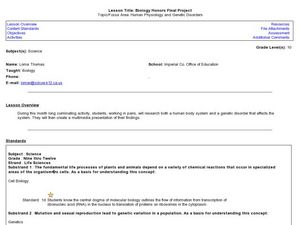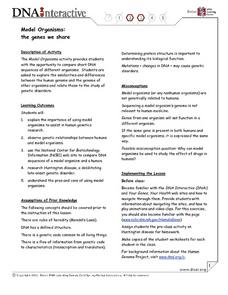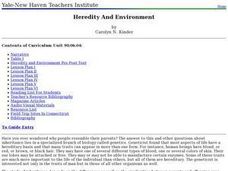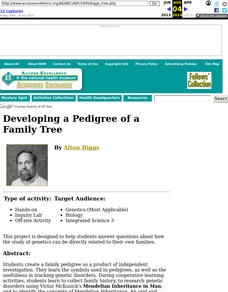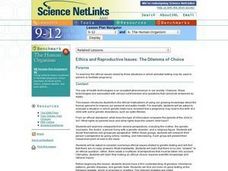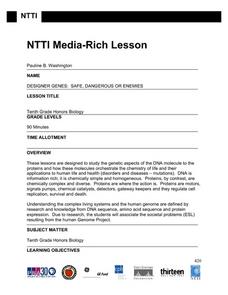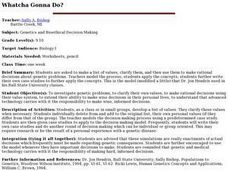Curated OER
Genetic Health Forum (G.H.F.)
Students achieve a week long activity in preparation for a group presentation on a human genetic condition
Curated OER
Inside Story: Your Body, Your Health
Learners research about different genetic disorders. In this biology lesson, students create a poster highlighting facts about the disorder. They present their findings in class.
Curated OER
Biology Honors Final Project
Tenth graders work on a project about cellular biology and genetics. In this biology instructional activity, 10th graders research about the assigned human body system and genetic disorders that affect it. They create a multimedia...
Curated OER
Model Organisms: The Genes We Share
Students gather information about gene banks. For this biology lesson, students work in groups to complete an activity sheet about genetic databases and organism genomes. Lesson includes extension ideas.
Curated OER
X Is For Wonderment
Pupils engage in a lesson plan that is concerned with the "X" chromosome and how ti is part of genetics with the use of Punnett squares. They use this tool in order to predict future genetic outcomes while focusing upon specific questions.
Curated OER
Heredity And Environment
Students complete a pre-test on the relationship between heredity and the environment. As a class, they write down descriptions of themselves and identify which traits can be changed and not changed. In groups, they determine which...
Curated OER
Sleep Disorders
Students reach sleep, dreaming and sleep walking. They research these topics at the provide web links as they read through the narrative and questions.
Curated OER
Genetic Technology
In this genetic technology worksheet, learners will answer 6 true or false statements and 4 short answer questions based on the mapping and sequencing of the human genome and the applications of the Human Genome Project.
Curated OER
Developing a Pedigree of a Family Tree
Students create a family pedigree as a product of independent investigation. They learn the symbols used in pedigrees, as well as the usefulness in tracking genetic disorders. During cooperative learning activities, students learn to...
Curated OER
Genetic Engineering
Students discuss the risks and benefits associated with biotechnology. In this biotechnology lesson, students discuss the role of genes in the body and brainstorm ethical issues relating to biotechnology. They read about an ethical issue...
Curated OER
Adrenoleukodystrophy (ALD):A Case Study Using the Film
Students study the genetic disorder Adrenoleukodystrophy (ALD) by viewing the film "Lorenzo's Oil". They complete a summary of the movie and answer questions while viewing the movie. Extensions activities also included.
Curated OER
Ethics and Reproductive Issues: The Dilemma of Choice
Students research various websites to answer questions and take part in class discussion regarding Prenatal testing. Students listen to an audio file and complete student worksheet. Students discuss different roles of people and...
National Center for Case Study Teaching in Science
Identical Twins, Identical Fates?
Can different personal experiences affect our genes? Find out in an intriguing case study about one twin who is diagnosed with mental illness and her identical twin who fears she may suffer the same fate. Designed for college-level...
Curated OER
Genome: The Secret of How Life Works
What do you have in common with a fruit fly? About 60 percent of your DNA. The resource, divided into two units, is intended for grades four to eight and another for high schoolers. Both units include eight lessons covering the...
Curated OER
Teaching Biology Through Bioinformatics
Wow! A very detailed slideshow covers complex topics of genome research methods. This is advanced and relevant to the highest level of school biology. Excellent resource if you wish to expose your class to scientific methods and...
Curated OER
Background of Diseases-- Germs or Genes?
Students explore the background of common diseases. For this personal health lesson, students research causative agents of communicable and non-communicable diseases. Students use their research findings to create data tables in...
Curated OER
The Genetic Basis of Neurological Disorders
Students describe some aspects of known genetic defects on the human neurological condition. They participate in a variety of exercises including drawings, games, and analogies.
Curated OER
Who's Who and How Do You Know for Sure?
Young scholars investigate the applications of DNA fingerprinting, They read crime scenarios and using the details of the crime and laboratory experimentation decide the suspects guilt or innocence.
Curated OER
Temperature and the Tomato
You will need a photovoltaic system and monitor at your school in order to obtain all of the data required to thoroughly implement this lesson. Your class monitors daily temperature and insolation amounts over a two week span of time....
Curated OER
Whatcha Gonna Do?
Students investigate genetic problems and clarify their own values. They make rational decisions using their value system, and extend their ability to make wise decisions in their personal lives.
Curated OER
Show 303: New Research into Dyslexia
Students explore the causes of dyslexia. They view CT sans and MRIs to view the brain and how it responds. Students read reports about dyslexia. They discuss the nature of dyslexia, its cause, how to diagnose it, and its permanency.
Curated OER
Risk Factor Roulette
Students examine "multiple chemical sensitivity" and how it relates to genetic variation and environmental factors. They read an article, conduct research, and identify risk factors related to chemical sensitivity, asthma, breast cancer,...
Curated OER
STS Biology - Teaching Controversial Topics
Each of the three activities submitted presents difficult science topics in the context of the human experience. The activities focus on real-world problems, which have science components, from the learners' perspectives.
Curated OER
Live Well Now to Live Longer Later
Ninth graders select a topic to research, completing the sentence, "Are the effects of _______ really that detrimental to one's health?" They record information in a journal, including sources of information. Students work in groups with...




